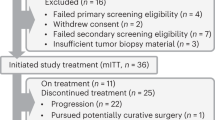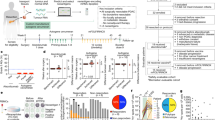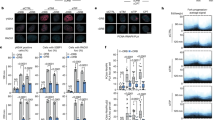Abstract
We were interested in developing oncolytic adenoviral vectors that can be administered systemically for the treatment of breast cancer. To restrict viral replication in breast tumor cells, we constructed mhTERTAd.sTβRFc, a 01/07-based adenoviral vector expressing the soluble form of transforming growth factor-β (TGFβ) receptor II fused with the human Fc IgG1 (sTGFβRIIFc) gene, in which viral replication is under the control of a modified human telomerase reverse transcriptase (mhTERT) promoter. In addition, mhTERTAd.sTβRFc-mediated sTGFβRIIFc production targets the TGFβ pathway known to contribute to the tumor progression of breast cancer metastasis. We chose to use the mhTERT promoter because it was found to be relatively more active (approximately 20 times) in breast cancer cells compared with normal human cells. We showed that infection of MDA-MB-231 and MCF-7 breast cancer cells for 48 h with mhTERTAd.sTβRFc produced high levels of sTGFβRIIFc (greater than 1 μg ml−1) in the medium. Breast cancer cells produced nearly a 6000-fold increase in viral titers during the 48 h infection period. However, mhTERTAd.sTβRFc replication was attenuated in normal cells. Infection of breast cancer cells with a replication-deficient virus Ad(E1−).sTβRFc also produced high levels of sTGFβRIIFc, but under these conditions, no detectable viral replication was observed. Adenoviral-mediated production of sTGFβRIIFc was shown to bind with TGFβ-1, and to abolish the effects of TGFβ-1 on downstream SMAD-3 phosphorylation. The administration of mhTERTAd.sTβRFc intravenously into MDA-MB-231 human xenograft-bearing mice resulted in a significant inhibition of tumor growth and production of sTGFβRIIFc in the blood. Conversely, intravenous injection of Ad(E1−).sTβRFc did not show a significant inhibition of tumor growth, but resulted in sTGFβRIIFc in the blood, suggesting that viral replication along with sTGFβRIIFc protein production is critical in inducing the inhibition of tumor growth. These results warrant future investigation of mhTERTAd.sTβRFc as an antitumor agent in vivo.
This is a preview of subscription content, access via your institution
Access options
Subscribe to this journal
Receive 12 print issues and online access
$259.00 per year
only $21.58 per issue
Buy this article
- Purchase on Springer Link
- Instant access to full article PDF
Prices may be subject to local taxes which are calculated during checkout






Similar content being viewed by others
References
Cancer Facts and Figures 2009 American Cancer Society, http://www.cancer.org/docroot/STT/stt_0.asp. 2009.
Seth P (ed). Adenoviruses: Basic Biology to Gene Therapy. R G Landes: Austin, TX, 1999.
McCormick F . Cancer gene therapy: fringe or cutting edge? Nat Rev Cancer 2001; 1: 130–141.
Seth P . Vector-mediated cancer gene therapy: an overview. Cancer Biol Ther 2005; 4: 512–517.
McCormick F . Future prospects for oncolytic therapy. Oncogene 2005; 24: 7817–7819.
Teicher BA . Malignant cells, directors of the malignant process: role of transforming growth factor-beta. Cancer Metastasis Rev 2001; 20: 133–143.
Roberts AB, Wakefield LM . The two faces of transforming growth factor beta in carcinogenesis. Proc Natl Acad Sci USA 2003; 100: 8621–8623.
Mundy GR . Metastasis to bone: causes, consequences and therapeutic opportunities. Nat Rev Cancer 2002; 2: 584–593.
Kang Y, He W, Tulley S, Gupta GP, Serganova I, Chen CR et al. Breast cancer bone metastasis mediated by the Smad tumor suppressor pathway. Proc Natl Acad Sci USA 2005; 102: 13909–13914.
Kingsley LA, Fournier PG, Chirgwin JM, Guise TA . Molecular biology of bone metastasis. Mol Cancer Ther 2007; 6: 2609–2617.
Kozlow W, Guise TA . Breast cancer metastasis to bone: mechanisms of osteolysis and implications for therapy. J Mammary Gland Biol Neoplasia 2005; 10: 169–180.
Yin JJ, Selander K, Chirgwin JM, Dallas M, Grubbs BG, Wieser R et al. TGF-beta signaling blockade inhibits PTHrP secretion by breast cancer cells and bone metastases development. J Clin Invest 1999; 103: 197–206.
Akhtari M, Mansuri J, Newman KA, Guise TM, Seth P . Biology of breast cancer bone metastasis. Cancer Biol Ther 2008; 7: 3–9 E-pub 13 Oct 2007.
Seth P, Wang ZG, Pister A, Zafar MB, Kim S, Guise T et al. Development of oncolytic adenovirus armed with a fusion of soluble transforming growth factor-beta receptor II and human immunoglobulin Fc for breast cancer therapy. Hum Gene Ther 2006; 17: 1152–1160.
Kim E, Kim JH, Shin HY, Lee H, Yang JM, Kim J et al. Ad-mTERT-delta19, a conditional replication-competent adenovirus driven by the human telomerase promoter, selectively replicates in and elicits cytopathic effect in a cancer cell-specific manner. Hum Gene Ther 2003; 14: 1415–1428.
Katayose D, Gudas J, Nguyen H, Srivastava S, Cowan KH, Seth P . Cytotoxic effects of adenovirus-mediated wild-type p53 protein expression in normal and tumor mammary epithelial cells. Clin Cancer Res 1995; 1: 889–897.
Craig C, Wersto C, Kim M, Ohri E, Li Z, Katayose D et al. A recombinant adenovirus expressing p27Kip1 induces cell cycle arrest and loss of cyclin-Cdk activity in human breast cancer cells. Oncogene 1997; 14: 2283–2289.
Yang YA, Dukhanina O, Tang B, Mamura M, Letterio JJ, MacGregor J et al. Lifetime exposure to a soluble TGF-beta antagonist protects mice against metastasis without adverse side effects. J Clin Invest 2002; 109: 1607–1615.
Wang ZG, Zhao W, Ramachandra M, Seth P . An oncolytic adenovirus expressing soluble transforming growth factor-beta type II receptor for targeting breast cancer: in vitro evaluation. Mol Cancer Ther 2006; 5: 367–373.
Seth P, Higginbotham J . Advantages and disadvantages of multiple different methods of adenoviral vector construction. In: Habib N (ed). Methods in Molecular Medicine. Hunana Press Inc.: Totowa, NJ, 2000 pp 189–198.
Seth P, Brinkmann U, Schwartz GN, Katayose D, Gress R, Pastan Ira et al. Adenovirus-mediated gene transfer to human breast tumor cells: an approach for cancer gene therapy and bone marrow purging. Cancer Res 1996; 56: 1346–1351.
Nguyen DX, Massague J . Genetic determinants of cancer metastasis. Nat Rev Genet 2007; 8: 341–352.
Clines GA, Guise TA . Mechanisms and treatment for bone metastases. Clin Adv Hematol Oncol 2004; 2: 295–302.
Acknowledgements
We thank Dr Janardan D Khandekar for his support of this research. We also thank Dr ZG Wang and Murali Ramachandra for their help, and Monica Tsang (R&D Systems) for providing the sTGFβRIIFc gene. This study was supported by NIH Grant R01CA127380 (P Seth).
Author information
Authors and Affiliations
Corresponding author
Rights and permissions
About this article
Cite this article
Hu, Z., Robbins, J., Pister, A. et al. A modified hTERT promoter-directed oncolytic adenovirus replication with concurrent inhibition of TGFβ signaling for breast cancer therapy. Cancer Gene Ther 17, 235–243 (2010). https://doi.org/10.1038/cgt.2009.72
Received:
Accepted:
Published:
Issue Date:
DOI: https://doi.org/10.1038/cgt.2009.72
Keywords
This article is cited by
-
The systemic delivery of an oncolytic adenovirus expressing decorin inhibits bone metastasis in a mouse model of human prostate cancer
Gene Therapy (2015)
-
Intravenous administration of adenoviruses targeting transforming growth factor beta signaling inhibits established bone metastases in 4T1 mouse mammary tumor model in an immunocompetent syngeneic host
Cancer Gene Therapy (2012)
-
Oncolytic Adenovirus Expressing Soluble TGFβ Receptor II-Fc-mediated Inhibition of Established Bone Metastases: A Safe and Effective Systemic Therapeutic Approach for Breast Cancer
Molecular Therapy (2011)
-
Bone metastasis in prostate cancer: emerging therapeutic strategies
Nature Reviews Clinical Oncology (2011)



